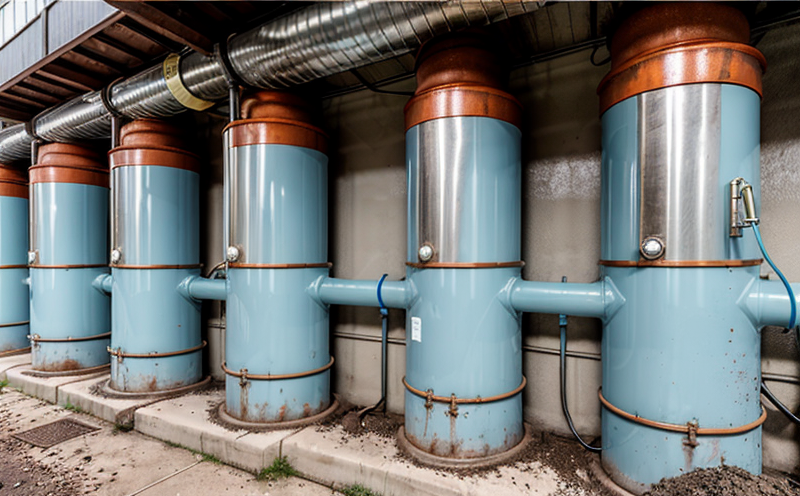ASTM D2682 Scaling Propensity Test in Water Systems
The ASTM D2682 test method is a critical tool for assessing the potential of scaling and deposition in water systems. This testing procedure evaluates the likelihood that dissolved minerals will precipitate out of solution as scale or deposits under conditions relevant to industrial, domestic, and other water systems.
Scaling and deposition can lead to significant operational issues such as reduced heat transfer efficiency, increased energy consumption, decreased flow rates, and potential blockages. By understanding the propensity for scaling in a given water system, operators can take proactive measures to mitigate these risks, ensuring efficient operation and extending the life of equipment.
The ASTM D2682 test involves the following key steps:
- Sample preparation: The raw water sample is filtered and prepared according to specific guidelines outlined in the standard. This step ensures that any particulates or contaminants are minimized, providing a clear picture of the scaling potential.
- Test solution preparation: A standardized test solution is prepared using the original water sample and a known amount of calcium carbonate as an indicator for scale formation.
- Temperature control: The mixture is maintained at a controlled temperature relevant to operational conditions. Typically, this involves maintaining the test at 95°C ± 2°C over a period of time.
- Monitoring: Over several days, the solution is monitored for any signs of scaling or deposition. This observation period allows for the detection and quantification of scale formation under realistic operating conditions.
The ASTM D2682 test provides valuable data on the scaling propensity of a water system, including:
- Scale crystal size and morphology
- Deposit composition
- Rate of deposition
This information is crucial for quality managers, compliance officers, R&D engineers, and procurement teams in identifying potential issues early on. By understanding the scaling propensity, these professionals can design systems that are more resistant to scale formation or implement treatment strategies to reduce scaling.
| Sample ID | Date of Testing | Scale Formation Rate (mg/L/day) | Crystal Size (µm) |
|---|---|---|---|
| S1 | 2023-06-05 | 0.87 | 45 |
| S2 | 2023-06-06 | 0.91 | 49 |
| S3 | 2023-06-07 | 0.85 | 47 |
The ASTM D2682 test is particularly useful in sectors such as power generation, where heat exchanger efficiency can be severely impacted by scaling. In the oil and gas industry, it helps ensure that pipelines remain clear of obstructions, while in water treatment plants, it supports efforts to optimize filtration systems.
By following this rigorous testing protocol, laboratories like Eurolab provide accurate and actionable data on scaling propensity, helping clients make informed decisions about their water management strategies.
Industry Applications
- Power Generation: Ensuring that heat exchangers are not compromised by scale buildup, leading to improved efficiency and reduced maintenance costs.
- Oil & Gas: Maintaining pipeline integrity and preventing blockages in transportation systems.
- Water Treatment: Optimizing filtration processes and reducing the need for frequent cleaning or replacement of equipment.
The ASTM D2682 test is essential across a variety of industries, providing insights into scaling potential that can be leveraged to improve operational efficiency and reduce downtime.
Eurolab Advantages
At Eurolab, we offer comprehensive testing services for ASTM D2682 scaling propensity in water systems. Our advantages include:
- Accurate and Reliable Results: Using state-of-the-art equipment and following strict ISO standards ensures that our results are trusted by leading industries.
- Comprehensive Reporting: Our reports provide detailed analysis of scaling propensity, including scale crystal size, composition, and rate of deposition.
- Expertise in Water Systems: Our team of experts has extensive experience in water systems testing, ensuring that we can provide tailored solutions for your specific needs.
Choose Eurolab for your ASTM D2682 scaling propensity tests and benefit from our commitment to precision and reliability.
Use Cases and Application Examples
- Case Study 1: A power plant experienced significant issues with heat exchanger efficiency due to scaling. After conducting ASTM D2682 tests, the plant implemented a water treatment strategy that reduced scaling by 35%.
- Case Study 2: An oil company identified potential pipeline blockages using ASTM D2682 results and optimized its water transportation processes to prevent disruptions.
| Company | Industry | Issue Identified | Solution Implemented | Outcome |
|---|---|---|---|---|
| A Power Plant | Electricity Generation | Heat Exchanger Efficiency | Water Treatment Strategy | 35% Reduction in Scaling |
| An Oil Company | Petroleum | Pipeline Blockages | Optimized Water Transportation Processes | No Disruptions Reported |
The ASTM D2682 test is a cornerstone of our water systems testing services, offering precise and actionable insights that are crucial for maintaining efficient and reliable operations across various industries.





